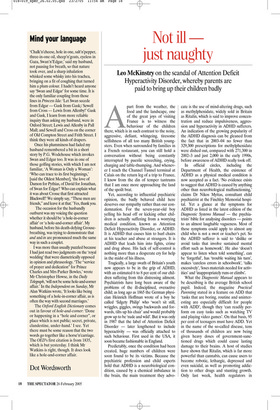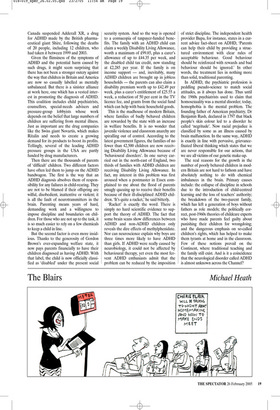Not ill — just naughty
Leo McKinstry on the scandal of Attention Deficit Hyperactivity Disorder, whereby parents are paid to bring up their children badly Apart from the weather, the food and the landscape, one of the great joys of visiting France is to witness the behaviour of the children there, which is in such contrast to the noisy, aggressive, defiant, whingeing, tiresome selfishness of all too many British youngsters. Even when surrounded by families in a French restaurant, you can still hold a conversation without being constantly interrupted by puerile screeching, crying, charging and table-thumping. And whenever I reach the Channel Tunnel terminal at Calais on the return leg of a trip to France, I know from the din of temper tantrums that I am once more approaching the land of the spoilt brat.
Yet, according to influential psychiatric opinion, the badly behaved child here deserves our sympathy rather than our condemnation. For the seven-year-old boy yelling his head off or kicking other children is actually suffering from a worrying medical condition, known as Attention Deficit Hyperactivity Disorder, or ADHD. It is ADHD that causes him to hurl chairs at his teacher and abuse at strangers. It is ADHD that leads him into fights, crime and drug abuse. His lack of self-control is nothing more than a desperate cry for help in the midst of his illness.
Tragically, a large swath of Britain’s youth now appears to be in the grip of ADHD, with an estimated 6 to 8 per cent of our children suffering from this distressing ailment. Psychiatrists have long been aware of the problems of the ill-disciplined, overactive child; as long ago as 1865 the German physician Heinrich Hoffman wrote of a boy he called ‘fidgety Philip’ who ‘won’t sit still, wriggles, giggles, swings backwards and forwards, tilts up his chair’ and would probably grow up to be ‘rude and wild’. But it was only in 1987 that the label of Attention Deficit Disorder — later lengthened to include hyperactivity — was officially attached to such behaviour. First used in the USA, it soon became fashionable in England.
Predictably, once the condition had been created, huge numbers of children were soon found to be its victims. Because the psychiatric profession and child experts hold that ADHD is a neurobiological condition, caused by a chemical imbalance in the brain, the main treatment they advo cate is the use of mind-altering drugs, such as methylphenidate, widely sold in Britain as Ritalin, which is said to improve concentration and reduce impulsiveness, aggression and hyperactivity in ADHD sufferers. An indication of the growing popularity of the ADHD diagnosis can be gleaned from the fact that in 2003–04 no fewer than 329,300 prescriptions for methylphenidate were dished out, compared with 271,300 in 2002–3 and just 2,000 in the early 1990s, before awareness of ADHD really took off.
In official circles, including the Department of Health, the existence of ADHD as a physical medical condition is now accepted as a fact. ‘No evidence exists to suggest that ADHD is caused by anything other than neurobiological malfunctioning,’ claims Dr Nikos Myttas, consultant child psychiatrist at the Finchley Memorial hospital. Yet a glance at the symptoms for ADHD as listed in the latest edition of the Diagnostic Systems Manual — the psychiatrists’ bible for analysing disorders — points to an almost laughable vagueness. Most of these symptoms could apply to almost any child who is not a swot or teacher’s pet. So the ADHD sufferer is said to ‘dislike or avoid tasks that involve sustained mental effort such as homework’. He also ‘doesn’t appear to listen when told something’, can be ‘forgetful’, has ‘trouble waiting his turn’, makes ‘careless errors in schoolwork’, ‘talks excessively’, ‘loses materials needed for activities’ and ‘inappropriately runs or climbs’.
What the Diagnostic Manual appears to be describing is the average British school pupil. Indeed, the magazine Practical Parenting stated in a feature on ADD that ‘tasks that are boring, routine and uninteresting are especially difficult for people with ADD’, though they ‘can readily perform on easy tasks such as watching TV and playing video games’. On that basis, 95 per cent of teenagers must have ADD. Yet in the name of the so-called disease, tens of thousands of children are now being given heavy doses of government-sanctioned drugs which could cause lasting damage to their brains. A host of studies have shown that Ritalin, which is far more powerful than cannabis, can cause users to become robotic, lethargic, depressed and even suicidal, as well as promoting addiction to other drugs and stunting growth. Only last week, health regulators in Canada suspended Adderall XR, a drug for ADHD made by the British pharmaceutical giant Shire, following the deaths of 20 people, including 12 children, who had taken it between 1999 and 2003.
Given the flimsiness of the symptoms of ADHD and the potential harm caused by such drugs, it might seem surprising that there has not been a stronger outcry against the way that children in Britain and America are now so casually labelled as mentally unbalanced. But there is a sinister alliance at work here, one which has a vested interest in promoting the diagnosis of ADHD. This coalition includes child psychiatrists, counsellors, special-needs advisers and pressure-group lobbyists whose work depends on the belief that large numbers of children are suffering from mental illness. Just as important are the drug companies like the Swiss giant Novartis, which makes Ritalin and needs to create a growing demand for its products to boost its profits. Tellingly, several of the leading ADHD pressure groups in the USA are partly funded by drug manufacturers.
Then there are the thousands of parents of ‘difficult’ children. Two different factors have often led them to jump on the ADHD bandwagon. The first is the way that an ADHD diagnosis absolves them of responsibility for any failures in child-rearing. They are not to be blamed if their offspring are wilful, disobedient, inattentive or violent; it is all the fault of neurotransmitters in the brain. Parenting means years of hard, demanding work and a willingness to impose discipline and boundaries on children. For those who are not up to the task, it is so much easier to rely on a few chemicals to keep a child in line.
But the second factor is even more insidious. Thanks to the generosity of Gordon Brown’s ever-expanding welfare state, it now pays parents financially to have their children diagnosed as having ADHD. With that label, the child is now officially classified as ‘disabled’ under the present social security system. And so the way is opened to a cornucopia of taxpayer-funded benefits. The family with an ADHD child can claim a weekly Disability Living Allowance, worth a maximum of £99.85, plus a carer’s allowance of up to £44.35 per week, and the disabled child tax credit, now standing at £2,285 per year. If the family is on income support — and, inevitably, many ADHD children are brought up in jobless households — the parents can also claim a disability premium worth up to £42.49 per week, plus a carer’s entitlement of £25.55 a week, a reduction of 50 per cent in the TV licence fee, and grants from the social fund which can help with basic household goods.
This is the madhouse of modern Britain, where families of badly behaved children are rewarded by the state with an increase in welfare benefits. It is no wonder that juvenile violence and classroom anarchy are spiralling out of control. According to the latest government figures, the families of no fewer than 42,500 children are now receiving Disability Living Allowance because of ‘behavioural disorders’. In one survey carried out in the north-east of England, two thirds of families with ADHD children are receiving Disability Living Allowance. In fact, my interest in this problem was first aroused when a postmaster in Essex complained to me about the flood of parents smugly queuing up to receive their benefits because of their ill-disciplined ADHD children. ‘It’s quite a racket,’ he said bitterly.
‘Racket’ is exactly the word. There is simply no hard scientific evidence to support the theory of ADHD. The fact that some brain scans show differences between ADHD and non-ADHD children only reveals the dire effects of methylphenidate. Nor can neuroscience explain why boys are three times more likely to have ADHD than girls. If ADHD were really caused by neurobiology, it could not be affected by behavioural therapy, yet even the most fervent ADHD enthusiasts admit that the problem can be reduced by the imposition of strict discipline. The independent health provider Bupa, for instance, states in a current advice fact-sheet on ADHD, ‘Parents can help their child by providing a structured environment with clear rules of acceptable behaviour. Good behaviour should be reinforced with rewards and bad behaviour should be ignored.’ In other words, the treatment lies in nothing more than solid, traditional parenting.
In ADHD, the psychiatric profession is peddling pseudo-science to match social attitudes, as it always has done. Thus until the 1960s psychiatrists used to claim that homosexuality was a mental disorder; today, homophobia is the mental problem. The founding father of American psychiatry, Dr Benjamin Rush, declared in 1797 that black people’s skin colour led to a disorder he called ‘negritude’. Now racial prejudice is classified by some as an illness caused by brain malfunction. In the same way, ADHD is exactly in line with pervasive, grievancefixated liberal thinking which states that we are never responsible for our actions, that we are all victims of our genetic make-up.
The real reasons for the growth in the number of poorly behaved children in modern Britain are not hard to fathom and have absolutely nothing to do with chemical imbalances in the brain. Primary causes include: the collapse of discipline in schools due to the introduction of child-centred learning and the loss of teachers’ authority; the breakdown of the two-parent family, which has left a generation of boys without fathers as role models; the politically correct, post-1960s theories of childcare experts who have made parents feel guilty about punishing their children for wrongdoing; and the dangerous emphasis on so-called children’s rights, which has helped to make them tyrants at home and in the classroom. Few of these notions prevail on the Continent, where traditional teaching and the family still exist. And is it a coincidence that the neurological disorder called ADHD is almost unknown across the Channel?

















































 Previous page
Previous page